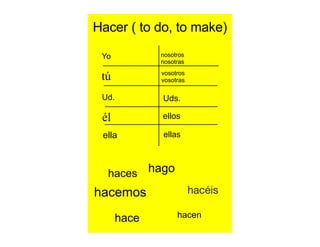
Hablar del tiempo con hacer
- 1. Hacer ( to do, to make) Yo nosotros nosotras tú vosotros vosotras Ud. Uds. él ellos ella ellas haces hago hacemos hacéis hace hacen
- 2. ¿Hace? Will that do? ¿Qué haces? What are you doing? or What are you making? Except for these questions, hacer never stands alone. It is always followed by a noun.
- 3. In weather terms Typically, weather terms use a third-person singular form of hacer followed by a noun. hace sol
- 4. ¿Qué tiempo hace hoy? What’s the weather like today? hace viento
- 5. hace calor
- 7. hace frío
- 9. Hace fresco.
- 10. Hace buen tiempo. Hace mal tiempo.
- 11. Weather expressions also use the Spanish word "Hay" which translates as "there is, there are"
- 12. Talking about the weather: The first thing you notice when talking about the weather in Spanish is the use of "hace" and "hay" whereas in English we use "to be" EG: It is sunny = Hace sol (literally it makes sun) It is hot = Hace calor It is very windy - Hace / Hay mucho viento
- 13. Two weather expressions do not use "hace" or "hay" Nevar - to snow Está nevando.
- 14. llover - to rain Está lloviendo
- 15. Está nublado.
- 16. tronar - to thunder Hay relámpagos Truena Está tronando It's lightning
- 17. Hay granizo It's hailing
- 20. Las cuatro estaciones Es una estación muy bonita. Llueve un poco pero hace buen tiempo. Hay muchas flores. Todo está verde. Unas fiestas importantes son la Pascua Florida, el Día de las Madres y en los Estados Unidos, el primero de abril, el Día de los Inocentes. La estación es __________.
- 21. Es la estación favorita de muchos niños porque tienen vacaciones muy largas y no hay clases. Hace mucho calor y mucho sol. Hay mucha gente en las playas. Los días son largos y las noches son cortas. La fiesta más importante en los Estados Unidos es el Día de la Independencia. La estación es __________.
- 22. Abren las escuelas y los niños regresan a las clases. Muchos niños están tristes, pero es una estación bonita. No hace frío. No hace mucho calor. Pero hace mucho viento. Los días de fiesta son el Día de la Raza (el aniversario del descubrimiento de América por Cristóbal Colón), la Víspera de Todos los Santos y el Día de Acción de Gracias. La estación es __________.
- 23. Hace mucho frío y nieva. Las personas necesitan mucha ropa cuando salen de la casa. Las noches son largas y mucha gente cree que es una estación triste. Pero hay muchas fiestas populares como la Navidad, los cumpleaños de Lincoln, Washington y King y el Día de San Valentín (el Día de los Enamorados). La estación es __________.
- 24. Complete the sentences based on the what you have just read. 1. El año tiene cuatro _______________. 2. Las estaciones son la _______________, el _______________, el _______________. 3. La estación de las flores se llama _______________. 4. Los muchachos no van a la escuela en _______________. 5. En el verano hace mucho _______________ y mucho _______________. 6. Los niños regresan a la escuela en _______________. 7. El día en que celebramos el descubrimiento de América se llama en español _______________. 8. En el _______________ nieva mucho. 9. Muchos niños reciben regalos (presents) en _______________. 10. El primero de enero celebramos _______________.
- 25. Para conversar en clase 1.¿Cuál es tu estación favorita? ¿Por qué? 2.¿Por qué es bonita la primavera? 3.¿Es triste el invierno? ¿Por qué? 4.¿Qué recibe la gente el Día de San Valentín?
- 26. Time Expressions with "hacer" The verb "hacer" can be used in a number of ways to indicate the length of time an action has been taking place. The first way uses the formula: Hace + time + que + present tense form of the verb Hace un año que estudio español. I have been studying Spanish for one year. Hace dos años que ellas estudian inglés. They have been studying English for two years.
- 27. To make this type of expression negative, just add the word "no" before the verb, as in the following formula: Hace + time + que + no + present tense form of the verb Hace un año que no estudio español. I haven't studied Spanish for a year. Hace dos años que ellas no estudian inglés. They haven't studied English for two years.
- 28. Another way to use the verb "hacer" to express how long something has been taking place is to use the following formula: Present tense form of the verb + desde hace + time Estudio español desde hace un año. I have been studying Spanish for one year. Ellas estudian inglés desde hace dos años. They have been studying English for two years.
- 29. To make this type of expression negative, again simply add the word "no" before the verb, as in the following formula: No + present tense form of the verb + desde hace + time No estudio español desde hace un año. I haven't studied Spanish for a year. Ellas no estudian inglés desde hace dos años. They haven't studied English for two years.
- 30. So, when it comes to using the verb "hacer" to express the length of time an action has been taking place, there are two ways to say the same thing: Estudio español desde hace un año. Hace un año que estudio español. I have been studying Spanish for one year.
